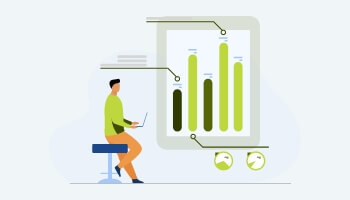The marketing world is changing the way it operates. Marketing strategists are gradually shifting from traditional marketing to digital marketing. Owing to its reach and cost-saving abilities, every brand has recognized the importance of digital marketing. To cater to the daily evolving goals of the digital marketing campaigns, Google has launched Google Analytics 4, i.e., GA4. GA4 Google Analytics is set to replace the traditional variant Universal Analytics.
GA4 Analytics aims to assist in making better marketing decisions and boosting the ROI (Return on Investment) of the marketing investment. Google announced its plans to sunset the erstwhile analytics arm Universal Analytics from July 01, 2023, and will stop processing new data from the mentioned date. The latest Google Analytics update is equipped with the most powerful features. Let us give you a comprehensive walkthrough of GA4: the future of Google Analytics.
What is GA4?


GA4 is the future of Google Analytics, surpassing universal analytics. It is the extended and enhanced version of the App + Web property feature released by Google in 2019. Hence it integrates both app and website data. GA4 Analytics allows you to quantify traffic and monitor engagement on your websites and apps.
With the emergence of GA4, it is worth noting that your existing analytics account won’t be affected. However, the older version is declining as every new analytics account will be on GA4. To use GA4, a new analytics property is required to be created. The new property will collect the latest data. It is advisable to use both accounts during the transition so that it can collect and analyze new data without the older data being lost.
New Features in GA4


GA4 focuses on collecting and processing data to analyze what’s next rather than relying on historic data for insights into what has happened already. To serve this purpose, it is equipped with some powerful features as follows –
-
- Machine learning-based clever insights about the journey of users across platforms:
Because of its existing machine learning mechanism, the latest Google Analytics update can identify the change in customer needs and correlate it with the product that may increase demand. One of the significant advantages of GA4 is with machine learning capabilities, where users can adjust their marketing strategies. Machine learning-enabled GA4 analytics can forecast average revenue per user (ARPU), an indicator of the profitability of a product based on the amount of money generated from each of its users or subscribers. Furthermore, the Google Analytics update uses machine learning to detect anomalies in reports, generate Google Ads forecasts based on the probability of conversions, and present customer outflow predictions to effectively invest in retaining customers.
-
- Extensive and seamless use of Google ads to optimize campaigns and ROI:
This has made it possible for marketing professionals to keep a separate check on conversions from YouTube, Google, other paid platforms, social media, etc. The new version of Google Analytics provides valuable insights that analyze user trends from start to finish across multiple platforms and devices. GA4 can offer a holistic user behaviour analysis and tell you where to focus marketing resources. In this way, companies can optimize ad campaigns and gain a greater ROI.
-
- Privacy centric and upgraded for the future:
Industry and technology standards such as GDPR update and focus more on user privacy. G4 Analytics can give the intended insights without compromising on the regulatory compliances. Internet and data privacy has never been more important, especially with the EU’s General Data Protection Regulation (GDPR) playing a key role. Majority of modern marketing relies on third-party cookies to collect data from consumers. However, these conventional methods are phased out in GA4. Google Analytics 4 uses machine learning-powered modelling to analyse users’ habits comprehensively. To put in simple words, MI insights fill in gaps when users’ data is not accessible with cookies being phased out.
GA4 vs. Universal Analytics


GDPR guidelines have made it mandatory for websites to take consent from users for cookies to track performance. It creates a significant gap to collect and analyze data when consent is not given. With the introduction of GA4, placing reliance on cookies is intended to be reduced and replaced with machine learning-based recording of events across platforms and devices. Hence third-party cookies will eventually phase out.
With universal analytics, user interactions are split into sessions, whereas with GA4 Google Analytics, the entire user journey is tracked, making the data more scalable and future-focused.
GA4 Analytics uses an event-based model to collect information from the entire user interaction. Each interaction is sent to GA4 as an individual event. Each event involves parameters such as user sessions and pageviews. Universal Analytics was based on a session-based model involving pageview hits and event hits.
Earlier, what we called ‘goals’ will now be addressed as ‘conversions.’ Universal Analytics allowed 20 goals in its free version, whereas Google Analytics 4 will offer 30 conversions.
Apart from technical changes, the user interface in GA4 is streamlined with its new data collection model. The new layout helps to anticipate user behavior better once you understand its data collection model. For example, you can get the hang of data collected by desktop devices in comparison to data compiled by mobile devices.
Other features such as event categorization, BigQuery connection, improved debugging, etc., make it necessary that you start collecting data with the help of GA4 right away. To summarize, here is how GA4 is different from Universal Analytics
- New Interface and Navigation
- Event-driven Data Model
- Codeless Event Tracking
- Customer-centric Measurements
- AI-enabled Insights and Forecasts
- Cookie-less Analytics Tracking
- Deeper Google Ads Integration
- Better Granular Data Control
- Free Integration with BigQuery
Important GA4 Reports to Boost Marketing Insights
Let us understand how the reports in GA4 can optimize your marketing campaigns.
-
- Realtime Report
A real-time report is one of the significant upgrades in GA4 analytics that shows events that happened in the past 30 minutes. The real-time report will help you confirm if the tracking code is working, view effects from a YouTube Video, and display new product drop as it happens in real time. Another exciting feature, “View User Snapshot”, lets you see a literal snapshot of a single user. It includes information about the user’s device, location, and real-time engagement with the site through events triggered.
-
- Life Cycle Reporting
Life cycle reporting mirrors the funnel of engaging, acquiring, monetising and retaining users. It is perfect for analyzing how users enter the conversion funnel and behave once they are in the funnel. Furthermore, GA4 includes user reports on technology, demographics, events and conversions.
Conclusion
With the latest Google Analytics update, Google is set to redefine how user data is used to run marketing campaigns. It will change the entire mechanism of defining digital marketing goals and achieving them. GA4 is one of the most efficient versions of analyzing cross-platform data in depth. Everything involved in GA4 is event-oriented instead of a session.
Google Analytics 4 is a machine learning-driven tool with business intelligence capabilities where businesses can gain better insights from consumer information. It is an ideal tool for the future of digital marketing.


